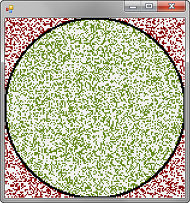Accelerator and F# (II.): The Game of Life on GPU
In the previous article, I introduced the Microsoft Research Accelerator library. It allows us to write computations with arrays in C# and execute them in parallel on multi-core CPU or more interestingly, using GPU shaders. In the previous artcile, we've seen how Accelerator works and how it can be accessed from F#. In this article, we'll look at one more interesting F# demo - we'll implement the famous Conway's Game of Life [1] using Accelerator. We'll use a v2 version of Accelerator which has been announced just recently and is available from Microsoft Connect [2].
This article is the second one from a series about using Accelerator from F#. Today, we'll use Accelerator types directly from F# - this is the simplest possible approach and is very similar to the way you'd work with Accelerator in C#. However, we can use some nice F# features such as custom operators to make the code more readable. In the next article, we'll discuss a different approach - we'll look how to execute more "standard" F# code (that doesn't reference Accelerator explicitly) with Accelerator using F# quotations. The list of articles may change, but here is a list of articles that I'm currently planning to write:
- Accelerator and F# (I.): Introduction and calculating PI
- Accelerator and F# (II.): The Game of Life on GPU
- Accelerator and F# (III.): Data-parallel programs using F# quotations
- Accelerator and F# (IV.): Composing computations with quotations
Published: Monday, 28 December 2009, 9:16 PM
Tags:
academic, functional, meta-programming, accelerator, f#, math and numerics
Read the complete article
Accelerator and F# (I.): Introduction and calculating PI

I already wrote about two projects that I worked on during an internship at MSR back in 2007 (ASP.NET support in F# and F# WebTools). Even though this was more than 2 years ago (and I did one more internship at MSR in the meantime), I still have one more project that I never published on the web. The folks from the F# team reminded me of this project recently, so I thought I could finally publish it. The project used Microsoft Research Accelerator [1, 2], which is a C# library for developing array-based computations and executing them on a GPU. More recently, the Accelerator team at MSR published Accelerator v2 [3], which was a good motivation to update my original project...
In this article, we'll look at the simplest way of using Accelerator from F#. Accelerator provides a managed interface that can be naturally used from both C# and F#. We can use a mix of method calls and overloaded operators to describe a computation. In F#, we'll also define our additional custom operators to make the code a bit nicer. After we introduce Accelerator using a simple C# demo, we'll look how to calculate an approximate value of the PI number using a Monte-Carlo method.
This article is the first one from a series about using Accelerator from F#. The list of articles may change, but here is a list of articles that I'm currently planning to write:
- Accelerator and F# (I.): Introduction and calculating PI
- Accelerator and F# (II.): The Game of Life on GPU
- Accelerator and F# (III.): Data-parallel programs using F# quotations
- Accelerator and F# (IV.): Composing computations with quotations
Published: Monday, 21 December 2009, 3:21 AM
Tags:
functional, academic, meta-programming, accelerator, f#, math and numerics
Read the complete article
Real-World Functional Programming: Completed and printed!
If you're following my blog or if you're interested in F# or functional programming in .NET, you probably noticed that I was working on a book Real-World Functional Programming. At some point, we called it Functional Programming for the Real-World, but then we changed the title back to a better sounding version Real-World Functional Programming (subtitle With examples in F# and C#). The book is also reason for a lower number of blog posts over the last year. Over the last month or so, we were doing the final edits, reviewing the final PDF version (I fixed quite a lot minor issues, synchronized book with the Beta 2 F# release and so on). Anyway, before a few days, I received the following email (as an author, I receive the same emails as those who ordered the book through the Manning Early Access Program, so that I can see what we're sending to our dear readers):

|
Dear Tomas Petricek, |
Finally finished!
Yes, that's right. The book is finally completed and as far as I know, it has been printed last week! If you already ordered the book, you won't receive it before Christmas, but it should come shortly after. I can't wait to see the book actually printed. The transition from the Word drafts I initially wrote to a final PDF version was already felt fantastic and I thought "It looks like a real book!" Among other things, there are now graphical arrows with comments inside listings, which looks really great and makes code listings much easier to read. Now I can look forward to seeing the actual book. Maybe I'm too conservative, but I have to say that I'm really glad that I wrote the book before everything is going to be published just electronically!
Here is a couple of links that you may found interesting if you want to look inside the book...
Published: Saturday, 19 December 2009, 9:54 PM
Tags:
functional, random thoughts, universe, writing
Read the complete article